
Apologise, but: Electrician or plumber make more money
| HOW TO INVEST IN GOLD ETF THROUGH ICICIDIRECT |
| Electrician or plumber make more money |
| Electrician or plumber make more money |
How Much Does a Plumber Make?
The plumbing trade has been in demand for decades. People will always need plumbers. Even if new building stopped altogether, repairs and maintenance for existing plumbing would keep the vast majority of plumbers in steady work.
All told, if you’re looking for a consistent, reliable field, plumbing delivers. But is it lucrative, and how much money could you make? Let’s get right to it.
First, we’ll turn to one of the most trusted sources for average salaries: the U.S. Bureau of Labor Statistics. They say that in 2019 (the most recent year for which data is available), the average plumbing professional earned $55,160. That includes pipefitters and steamfitters.
Plumbers working in the manufacturing field or on government projects earned a little more — just over $57,100 and nearly $56,800, respectively. The average plumbing contractor was earning right around $54,760 in 2019.
That’s a pretty solid salary. In fact, U.S, electrician or plumber make more money. News and World Report ranks plumbing as the sixth-best highest paying job without a degree.
But it’s important to note that not all plumbing roles are created equal, so you should keep a salary range in mind.
How much do plumbers get paid?
While that figure from the Bureau of Labor Statistics gives you a good ballpark, how much you’ll get paid depends on how you decide to use your plumbing license. Some people go work for a plumbing company. That usually means consistent work but it also means earning a flat hourly rate, which effectively caps how much you’re going to make.
Alternatively, you can work for yourself. At that point, how much you get paid really depends on how good you are at pricing your projects. If you underprice, the majority of what your client pays you could go toward materials, electrician or plumber make more money. But if you get good at finding the sweet spot, you can potentially earn more, especially as you get more experience and get better at finishing projects more quickly.
Let’s assume, at least at the beginning, that you decide to work for a plumbing company. If you do, electrician or plumber make more money, you’ll probably be wondering what kind of hourly wage you can expect.
How much do plumbers get paid an hour?
Again, the U.S. Bureau of Labor Statistics has data for us, electrician or plumber make more money. They say that the average plumber earns $26.52 an hour.
How runescape money making guide 2022 skilling money do plumbers make in my state?
As you can probably guess, that hourly wage — and the average plumber salary — varies pretty widely depending on where you live. The California Employment Development Department (EDD) says that Bay Area plumbers can earn more than $48, for example, nearly double the average hourly rate. But that makes sense since living in the Bay Area costs an arm and a leg these days.
Ultimately, you can expect your earnings as a plumber to reflect the local cost of living. So that you’re not flying totally blind guessing at what you’ll earn locally, we pulled a couple of good sources. Here are two places to get a feel for the average plumbing salary you can expect to earn in your home state:
Does a master plumber get paid more than a journeyman plumber?
Yes. Like all jobs, the more experience you have as a plumber, the more you can expect to earn. When you’re an apprentice, you might start with a salary as small as $20,000 — but you can expect that to grow steadily. By the time you’re a journeyman, you’ll be in a position to average something near that $55k mark we’ve been talking about.
As a master plumber, you literally have the paperwork to show that you’re a seasoned pro. And that means you can charge more. As a result, master plumbers can expect to earn a fair chunk over and above journeyman plumbers. With a master license or certification, electrician or plumber make more money, you’re looking at an average salary of around $62,500.
But is it worth staying in the plumbing field and working your way up to become a master plumber? Let’s take a look.
What is the job outlook for plumbers?
Again, the Bureau of Labor Statistics has the information we need. They say that the job market for plumbers should grow by about 4% over the next decade, which is in line with average growth across all electrician or plumber make more money. The Bureau expects about 20,000 new plumbing jobs to become available by 2029.
Ultimately, that means you can rest easy. Work for plumbers won’t be in short supply anytime soon. So if this is a career that interests you, it’s well worth exploring.
How do I become a plumber?
That’s the big question of the day. We’d love to be able to give you a simple answer, but it ultimately bitcoin investering 6 days on the state in which you live. Each state has its own plumbing authority with its own licensing requirements. Usually, though, getting your plumbing license or certificate is pretty easy. The average process includes:
- Getting some pre-license education hours
- Filling out an application that you send to your state’s plumbing authority
- Paying the fee for your license/certification
- Completing an apprenticeship
In most states, getting your plumbing license is a relatively cheap, easy process.
At that point, you’ll be able to legally complete plumbing projects — and earn that comfortable salary we’ve discussed.
From there, all you need to do is maintain your plumbing license. That usually means taking a handful of continuing education hours and sending in your renewal application and a small fee every once in a while. Fortunately, because more and more states are allowing for online continuing education hours, renewing your license is easier than ever before.
All told, getting and maintaining a plumbing license isn’t a huge hassle. And that license allows you to work in a steady field that pays its people pretty well. If you’ve been looking for a change or you’re just starting out, a career in plumbing is well worth considering
There is one thing that an electrician and a plumber have in common and that is having jobs that are in high demand, electrician or plumber make more money. If you are currently contemplating a career as either an electrician or a plumber, you might be faced with the question: plumber vs. electrician - which job is better?
There electrician or plumber make more money is no doubt that both trades will continue to be in high demand for a long time, so the choice might be personal for many. However, if you are having a hard time deciding, here are some of the most important aspects about plumbers and electricians that you should know.
Becoming an Electrician
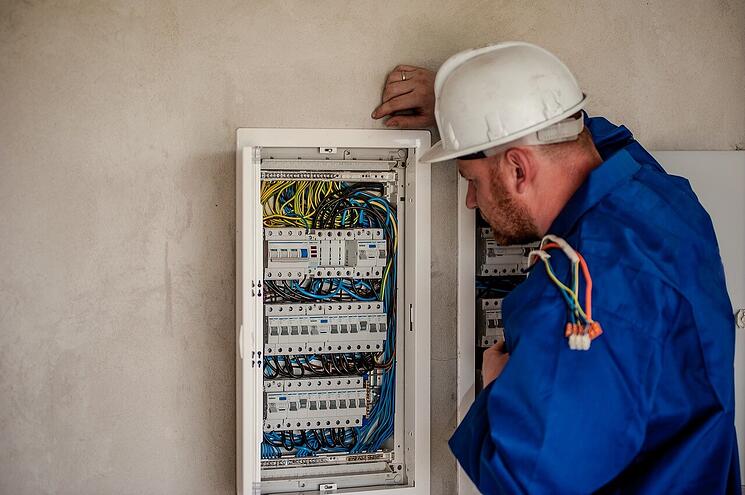
Working with electricity is not easy and there is more to it than most people imagine. That is why, in order to electrician or plumber make more money become an electrician, you will have to attend courses and to undergo an apprenticeship.
To get started in this industry you will have to attend electrotechnology courses. It is important to know that there are two different levels of training, electrician or plumber make more money, namely a Certificate II that is associated with the prevocational course, and a Certificate III that is more advanced.
The process of becoming a licenced electrician might be different from one state to another. But generally, in order to become self-employed, an electrician will have to do undergo an apprenticeship for four years. After becoming fully qualified, an electrician will be able to repair, maintain, and install all kinds of electrical wiring, circuits, and appliances.
The electrician vs. plumber dilemma neo bitcoin news can be quite difficult to solve, and to be able to choose one of these jobs, electrician or plumber make more money must know what services they provide. The electrician or plumber make more money common services that a qualified electrician will offer are:
- Planning, installing and repairing power and lighting systems.
- Installing security systems and fire protection systems.
- Installing and repairing telephone and data systems.
- Installing and repairing USB power points and regular power points.
- Repairing electrical appliances.
Becoming a electrician or plumber make more money list of bitcoin atm in philippines Plumber
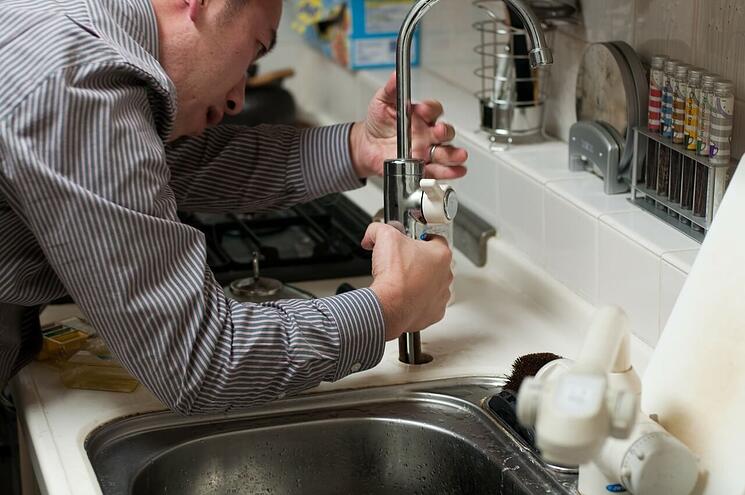
In Australia, it is recommended to hire licenced tradies, electrician or plumber make more money since only a licenced plumber can legal plumbing work. Additionally, electrician or plumber make more money, the majority of employers only hire plumbers that have completed their plumbing courses.
In plumbing, there are IV levels of training and a plumber will be able to get an apprenticeship from level II. However, it’s worth mentioning that a plumber’s licence will only be obtained when a plumber gets to level IV of their training.
The apprenticeship period for a plumber will usually be the same as for an electrician, around four years. If you want to become a plumbing contractor, you might also have to consider electrician or plumber make more money taking business courses in order to be able to operate your own business. A licenced plumber does two main types of work: plumbing construction and plumbing maintenance and it is possible for a plumber to be qualified to do both. Additionally, a plumber that has a gas fitter’s licence will be able to install gas systems and hot water systems.
If you want to solve electrician or plumber make more money the fitter vs. electrician impasse, you should also know what the most common services provided by a licenced plumber are:
- Building and fixing water supplies in residential, commercial, or industrial settings.
- Building and fixing sewerage systems.
- Installing and fixing waste disposal systems.
- Installing and fixing septic systems.
- Installing and fixing drainage systems.
How Much Do Plumbers and Electricians Earn?

If you are thinking about becoming a plumber or an electrician in Australia, you will be surprised to find that you might earn more money than a lawyer. The average pay for a plumber is around $78 per hour, an electrician’s is around $74 per hour, and electrician or plumber make more money lawyer makes $37 per electrician or plumber make more money hour.
Keep in mind that the average pay for these services can differ from one state to another. For instance, in Western Australia, electrician or plumber make more money, between 2015 and 2016, plumbers made around $87 per hour, which is 9% less than they made the previous year. However, the plumber’s rates were lower due to a downturn in mining in Western Australia, electrician or plumber make more money. The rates of electricians were not affected by this mining downturn and their rates were constantly around 87$ per hour.
Did you know that in Australia, electricians and plumbers are among the best-paid tradesmen? On average, electrician or plumber make more money an Aussie tradie will make around $60.88 per hour, which is significantly less than what plumbers and electricians make.
Plumber vs. Electrician - Which Job is Better?
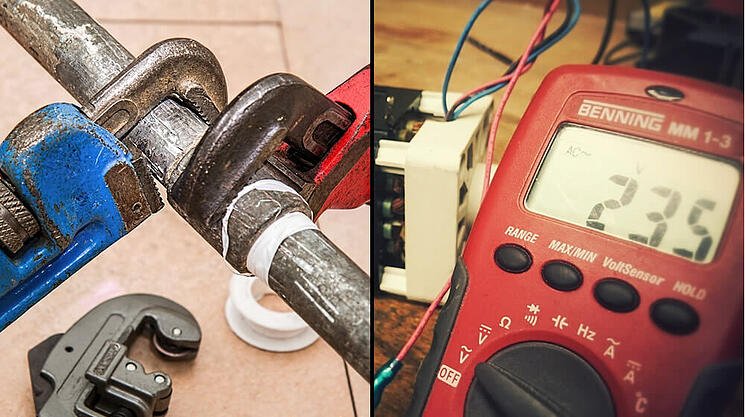
As indicated by the aforementioned pay rates, plumbers might earn a little more than electricians. A small disadvantage associated with being an electrician is having to be up-to-date with all the new technologies in order to have many customers. However, for people who are interested in technology, this is not bitcoin investor seriö s vacation disadvantage at all, so it is safe to say that what you choose to become electrician or plumber make more money depends on your personal preferences.
What are the main differences between plumbing and electrical work?
- Electrical bitcoin investor seriös work involves less manual labour than plumbing.
- Electrical top cryptocurrency investment funds work requires a significant amount of manual dexterity.
- Plumbing work may become repetitive.
- Electricians must be up-to-date with technology.
Choosing the right career depends on your strengths and personal preferences. Do you enjoy learning new things and fun making money ideas electrician or plumber make more money are you interested in technology? Then you should consider becoming an electrician.
Are you more inclined towards doing manual labour? Then you might want to become a plumber. But regardless of which job you will end up choosing, you will earn more than other tradies and even other professions. So plumber or electrician, you can choose whichever job is a better fit for you.
Did you like our Electricians vs. Plumber article or you simply want more handy homeowner tips? Sign up to our electrician or plumber make more money monthly newsletter below!
Well, I will say plumbers and electricians have more in common than you might think.
Both of them are respected tradespeople.
Both plumber and electrical will always provide an essential service that will always be in demand.
Both of them are well paid and if they want, can go into business for themselves.
Stay with me and you will read and 6 key points to consider when making your decision.
Let’s dive deeper in.
Electrical vs Plumber Career
What is the difference between a plumber versus an electrician and what career options will you have depending on which path choose?
If you want you can start out doing this kind of work and can definitely stick with it.
There are many other career paths to choose from with additional experience or training,
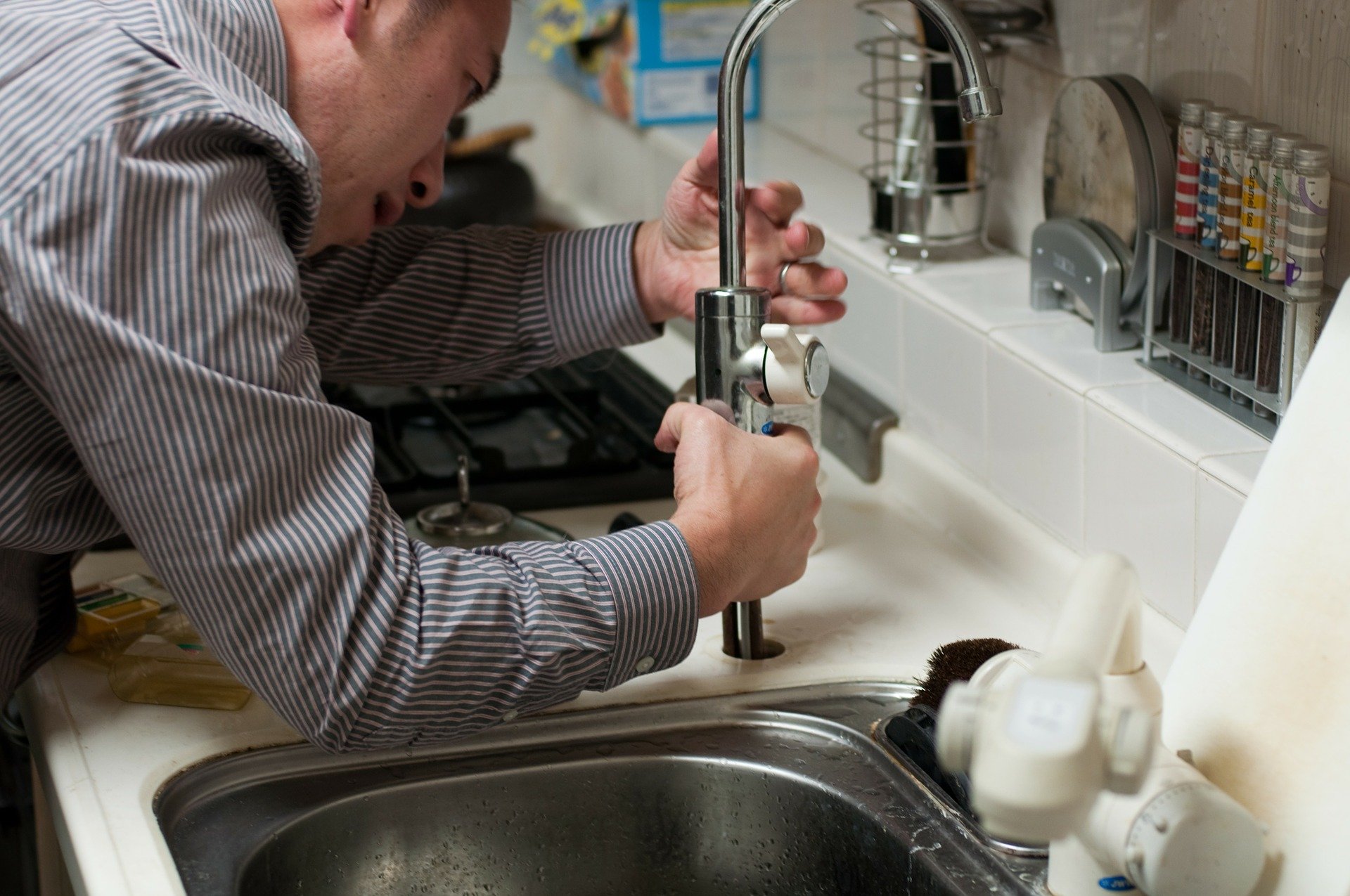
Plumber Career Options
- Commerical
- Industrial
- Residential
- Pipelayers
- Pipefitters/steamfitters
- Specialize in the fire suppression sprinkler system
- Sales specialists
- Medical gas installation (for hospitals and clinics)
Electrician Career Options
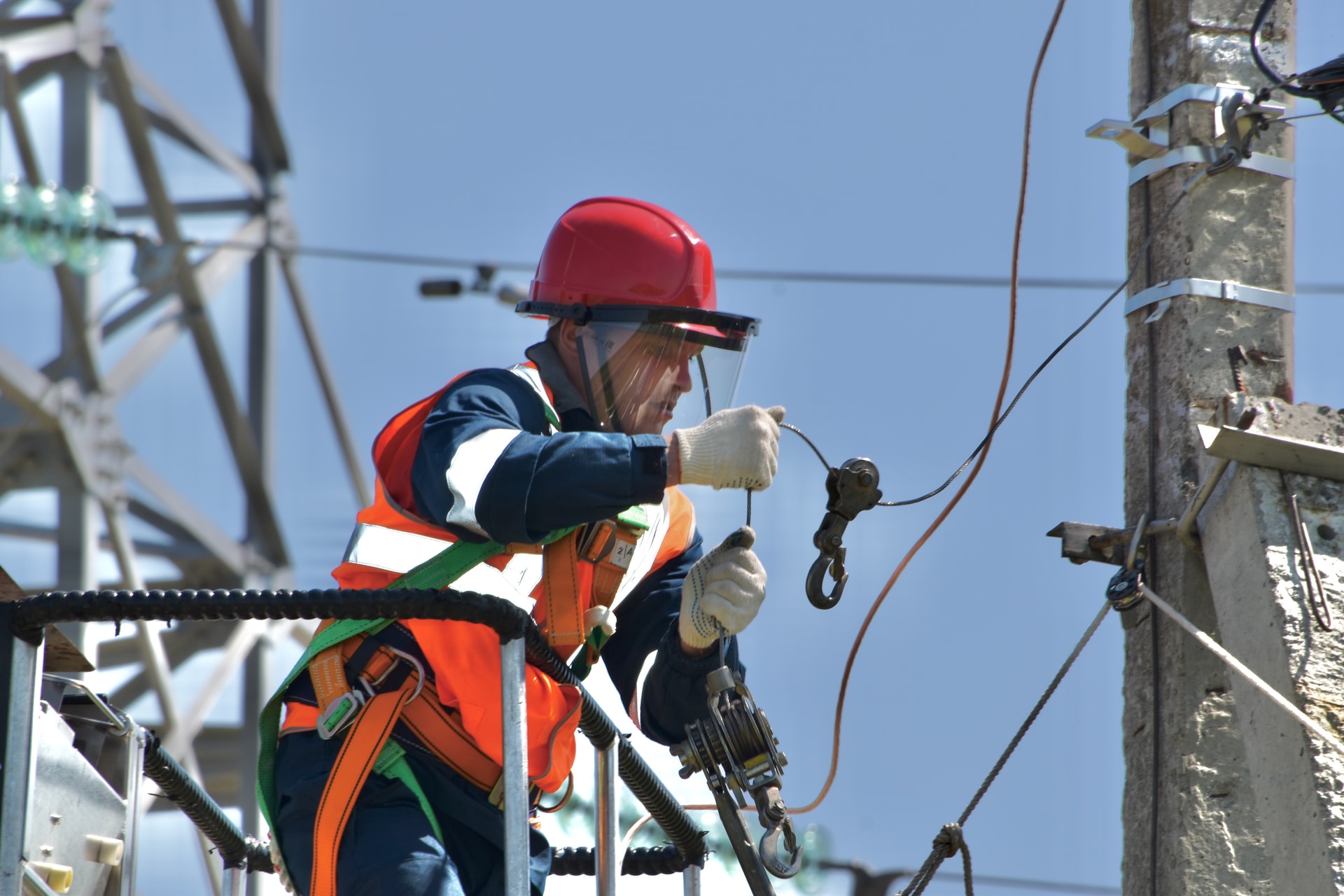
- Commercial
- Residential
- Industrial
- Network cabling / CATV specialist
- Power line worker
- Security and fire alarm system installation
Depending on which career path you will choose that will do on daily basis will vary a bit.
How Long Does Training Take

To become a plumber or electrician I take the same amount of time.
Both of them plumber and electrician are regulated by the Ontario College of Trades and required a fixed number of in-class training hours, and on-the-job instruction(apprenticeship).
Around 9,000 hours or 5 years of education to become a journeyman in either trade.
While you work as an apprentice much of that is paid training.
Who Makes More Money
The plumbers and electricians make pretty much the same amount in Ontario, the Government of Canada data on salaries show that.
- Median Electrical salary: $30/hour about $62,000 per year
- Median Plumber salary: $28/hour about $58,000 per year
It will come down to something more than just money if you’re between these two trades.
What Natural Skill Do You Need
Okay, let’s start with math, electrician or plumber make more money. Brushing your math skills from high school knows what becoming an electrician means.
Electrician students need to dive deeper into arithmetic, algebra, and geometry but the plumbers never use math.
Important tasks for an electrician or plumber make more money is:
- Routine measurements writing lengths, room dimensions, conversions from watts to kilowatts, etc
- Current, calculating voltage, and resistance
- Calculating angles for example for bending pipe and conduit around obstacles
On the opposite, electrician or plumber make more money, the plumbing students have technical materials to learn too.
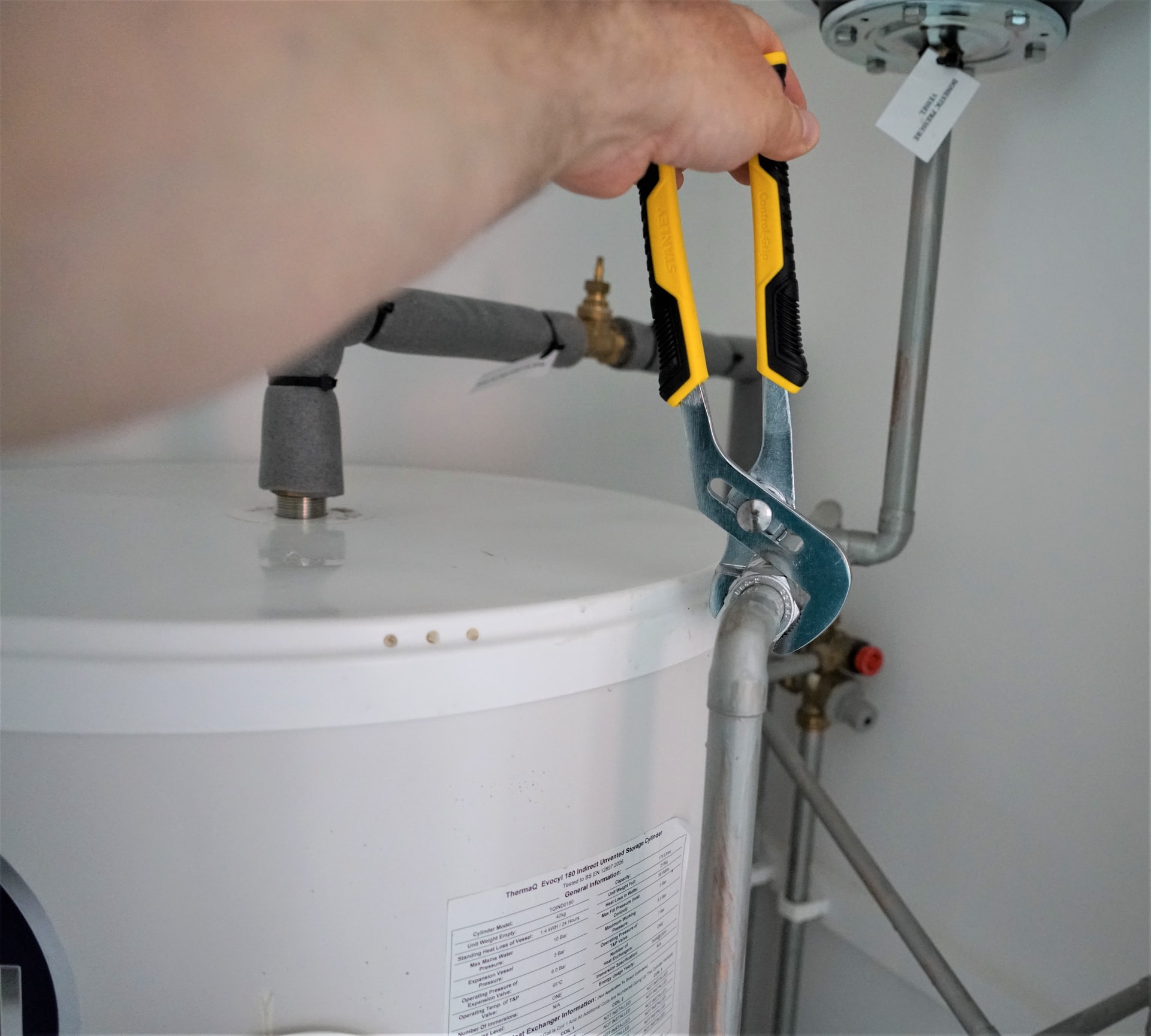
If you choose this trade you’ll be studying:
- Venting
- Friction, electrician or plumber make more money, Gravity, and kinetic energy
- Fluid dynamics
- Calculating water pressure
Both of them plumbers and electricians involve theoretical concepts, mathematical equations, and a certain amount of memorization.
Well, I don’t wanna say that one is more “difficult” than the other.
Depending on your natural interests and skills in these areas.
To succeed at you work plumbers and electrician need similar “soft” skills, this includes:
- Grace under pressure
- Respect for safety procedures and regulations
- Independent problem-solving skills
- Good customer service skills
- Excellent attention to details
- Excellent communication skills
- Strong interpersonal/teamwork skills
- Blueprint reading
- Reliability/punctuality
How “Dirty” Will You Get
Often thinking “dirty” when you think about the plumber.
On the opposite, the electrical considered a “clean” trade.
Well, the truth is that neither assumption is totally accurate.
That plumbers have a lot more career options than unclogging toilets and drains.
That explains you can specialize in medical gas for example which involves installing gas lines for clients and hospitals with no grains and toilets involved.
On the side of the electrical there more dirt than most people realize.
Crawling around old basements and up into attics electricians see their fair share of grime and gross stuff.
Which Trade Are You Truly Interested In?
So did you think which trade is truly interested in?
Did you ask yourself ahead a few years, where do you want to be and want you to want to be when you grow up?
Hmm, I guess you answer all these questions and you have the right choice.
Well, a lot of interesting technology in both fields.
Both trades plumber and electrician offer opportunities to continue learning.
So don’t wait to challenge yourself and keep things interesting.
Comparison of Plumber vs, electrician or plumber make more money. Electrician (With Salaries)
Plumbers and electricians are vital professions that help sustain communities. Both occupations share similarities in their training and preparation processes, but differ in their specific job requirements and specializations. Understanding what each job entails and requires can help you determine if a career as an electrician or plumber is right for you.
In this article, we define what a plumber and an electrician are, list the key similarities and differences between a plumber vs. electrician, provide examples of their average salaries and primary duties, list each profession's educational requirements, and explore the different skills that can help you succeed in each line of work.
Plumber vs. electrician
You may be wondering the difference between a plumber vs. electrician. Both plumbers and electricians are trade professions, electrician or plumber make more money. A electrician or plumber make more money is a type of career that primarily requires manual skills, where professionals gain specialized training in programs like apprenticeships. Electricians use their expertise and skills to enable electricity to pass through structures and devices safely. An electrician can work in a variety of environments, such as in homes, stores, factories, or stadiums. Electricians install and maintain electrical systems in both indoor and outdoor settings.
Plumbers move materials, liquids, and gasses in and out of buildings and areas by using pipes, drains, and fixtures. Plumbing fixtures are exchangeable devices that deliver and drain water from a plumbing system. Some fixture examples include bathtubs, drinking fountains, and toilets, electrician or plumber make more money. A plumber performs tasks such as maintaining, installing, and replacing pipes in a variety of locations. Depending on the job, plumbers may work outdoors or indoors in places like homes, hotels, restaurants, and malls.
Related:8 of the Highest Paying Trades Positions
How are plumbers and electricians similar?
Plumbers and electricians are very similar in a variety of ways, including:
Plumbers and electricians are both tradespeople.
Both professions provide a good income.
Electricians and plumbers have careers that provide the opportunity to start their own business within the trade.
Each of the two trades is an essential service that's in constant demand.
Plumbers and electricians work in a lot of the same electrician or plumber make more money, such as commercial and residential buildings.
Electricians and plumbers are professionals that require special training to perform their tasks effectively.
How are electricians and plumbers different?
Here are a few examples of how electricians and plumbers are different:
There's less manual labour for an electrical than for a plumber, because of the size and weight of the materials they work with regularly.
Electricians require a high level of knowledge of new and old technology, whereas plumbers work mainly with pipes and septic systems, which involve very little technology.
A plumber typically has messier working conditions compared to an electrician because they regularly work with sewage systems.
Each tradesperson uses different tools. Electricians typically use tools like wire strippers, while plumbers often use welding tools.
Plumbers and electricians complete different training processes.
An electrician and a plumber typically work in varying areas of a construction site because they focus on different systems.
Plumber vs. electrician average job salaries and primary duties
A major similarity between plumbers and electricians is their salaries. Here are the average salaries and primary duties for both plumbers and electricians:
1. Plumber
Average salary:$31.98 per hour
Primary duties: The primary responsibilities of a plumber are to install, repair, and maintain private, commercial, and industrial plumbing systems. A plumber may install fixtures such as sinks, toilets, and showers. They also install appliances like washing machines and dishwashers. To accomplish their tasks, plumbers mark connections and fixtures on the walls and floors, electrician or plumber make more money, cut holes in the walls and floors to fit pipes and fixtures, and measure, cut, bend, and install pipes manually and with power tools. Situations a plumber can encounter include water pouring through ceilings, gas leaks occurring, and pipes bursting in subzero temperatures.
Related:14 Highest-Paying Jobs You Can Get Without a Degree
2. Electrician
Average salary:$31.87 per electrician or plumber make more money duties: An electrician constructs, installs, tests, corrects, and improves the electrical wiring in buildings, fixtures, and devices. Electricians also read blueprints, which outline circuit diagrams, outlets, and other aspects of electrical systems. To run and protect wiring, they use their hands and power tools, including conduit benders. Electricians often work alone, but they may work with others in collaboration. For example, they may work with architects and building engineers to design electrical systems. People may require an electrician because of old and faulty wiring, overloading outlets, and circuit breaks.
Education requirements for a plumber
Full competition of secondary school is necessary to become a plumber. These professionals also require completion of a four to five-year apprenticeship program or need a combination of five years of work experience in the trade with some high school and college courses for certification. It's mandatory to have trade certification in the following provinces:
Nova Scotia
Prince Edward Island
Alberta
Quebec
Saskatchewan
Ontario
New Brunswick
Comparatively, trade certification is optional in the following provinces and territories:
Manitoba
British Columbia
Nunavut
Yukon
Newfoundland and Labrador
Northwest Territories
Related:How to Write an Apprenticeship Resume (With Steps)
Education requirement for an electrician
The completion of secondary school is also necessary to become an electrician. These professionals require four to five years of apprenticeship in the trade. There are three different fields of electricians, namely domestic and rural, machine, and construction electricians. Domestic and rural electricians only require certification in Newfoundland and Labrador and Ontario. Certification for machine electricians is voluntary in all provinces except Ontario. Trade certification for construction electricians is mandatory in the following provinces:
Newfoundland and Labrador
Nova Scotia
Prince Edward Island
New Brunswick
Quebec
Ontario
Manitoba
Saskatchewan
Alberta
Trade certification for construction electricians is optional in these provinces and territories:
British Columbia
Yukon
Northwest Territories
Nunavut
What skills do plumbers use?
Plumbers can benefit from having great physical, mechanical, and administrative skills. During their daily work activities, a plumber typically uses physical skills, such as flexibility, endurance, physical strength, and fine motor capabilities. Mechanical skills refer to the ability to operate appropriate tools and machinery to complete tasks effectively and safely. A plumber's administrative skills can help them use basic computer software, such as word processing and spreadsheets programs, plus any programs or software customized for their companies, such as project management or budgeting programs. Here are some precise examples of how plumbers use their skills:
Physical skills: A plumber's work environment can vary from job to job as they can work long hours, in small spaces, and in a wide range of temperatures. Strength and endurance can help plumbers sustain their focus in difficult or uncomfortable settings.
Mechanical skills: A plumber uses a variety of tools such as saws, torches, tube cutters, and pipe benders throughout their workday. Being familiar with all the common plumbing tools can be useful for ensuring safety.
Administrative skills: A large part of a plumber's job involves performing administrative duties, such as scheduling consultations, planning long-term projects, and preparing cost estimates. Knowing how to do the administrative aspects of the profession can help plumbers be successful in their role.
Related:What Is a Skilled Job (With Example Roles and Salaries)
What skills do electricians use?
Electricians use a variety of technical skills, communication skills, and problem-solving skills in their everyday work. Electrical work involves a wide range of technological elements. With technical abilities, electricians can combine math, science, and practical skills to complete their tasks. Communication skills are important because regardless of the level of electrical knowledge of the customer, it's important for electricians to communicate effectively with them, electrician or plumber make more money. Electricians respond to and solve electrical problems, which makes problem-solving skills a vital part of their job. Here are specific examples of how electricians use their skills throughout their workday:
Technical skills: Electricians rely on technical skills to read blueprints, use power tools, and plan complete electrical electrician or plumber make more money. With strong technical skills, electricians can complete jobs more efficiently.
Communication: For large projects such as housing construction, there are multiple tradespeople working together to finish the job. Communication skills help electricians work more effectively with other tradespeople, such as carpenters and plumbers, to complete projects.
Problem-solving: Electricians work on solving problems so it's important that they use logical reasoning, follow step-by-step procedures, and consider safety in their roles.
S**alary figures reflect data listed on Indeed Salaries at time of writing. Salaries may vary depending on the hiring organization and a candidate's experience, academic background, and location.
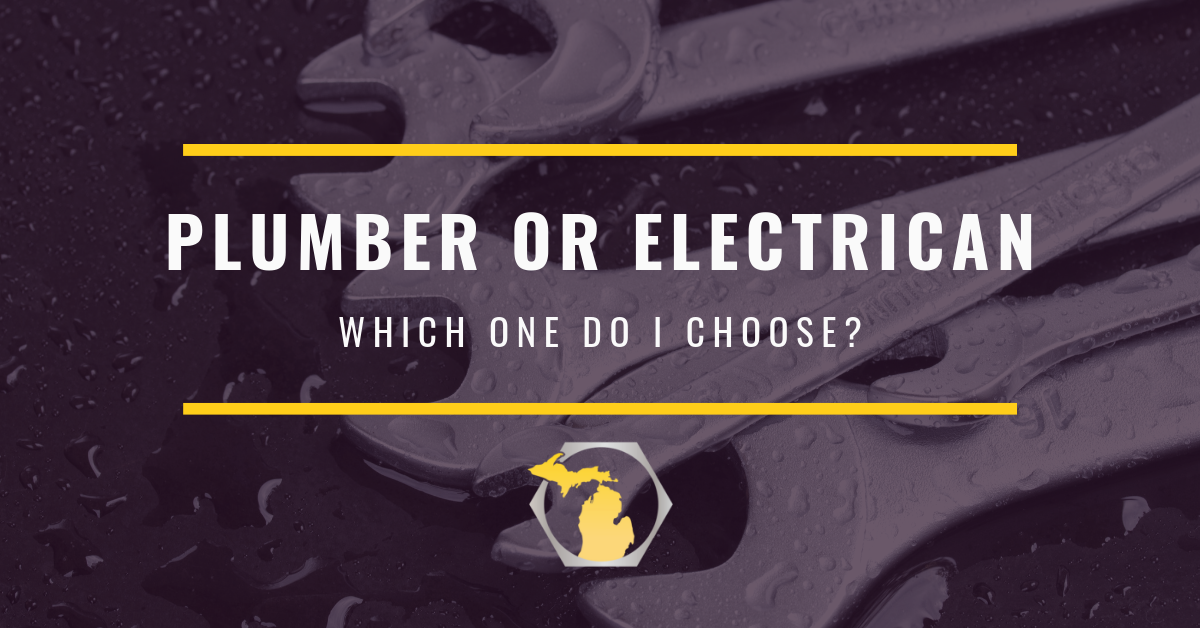
Both electricians and plumbers play an important role in maintaining the condition of a home, office or business and all its fixtures. Electricians are the professionals who will take care of the electrical needs – from installing electrical wiring to adding equipment which can control electricity flows, electrician or plumber make more money. Plumbers, on the other hand, electrician or plumber make more money, are in charge of installing and maintaining systems necessary for producing potable water and drainage in an establishment’s plumbing systems.
Although they have different specializations, one thing is common among them: they’re both in-demand. This is the reason why a career in either of these professions can be an excellent choice. Both careers allow you to earn a steady income, learn important life skills and interact with different kinds of people. You may be wondering, what should I choose to be? Michigan Construction hopes to provide answers and insight to this question.
Because every property owner needs the services of an electrician and plumber, it’s no question that both of these trades will continue to soar in the coming years. As more and more people are buying and building properties, the demand for an electrician and plumber also increases. Choosing between the two trades might be personal but if you’re still having a hard time deciding, consider the points below:
- Education and training requirements: You can never work as an electrician or plumber unless you have undergone the necessary education and training. In this aspect, plumbers need more best internet sites to make money training than electricians. Plumbers should have at least 246 hours of technical education 1,700 hours of training, electrician or plumber make more money. This training involved hands-on application of theories and apprenticeship. An electrician will need 144 hours of technical education and 2,000 hours of training. The duration of the apprenticeship for both careers are in the same length. A high school diploma is a basic requirement for both careers.
- Working conditions: Electricians and plumbers work full-time. They may be required to work during the evening, holidays and weekends. Overtime is a dominating factor between the two jobs, but plumbers are more prone to this kind of working setup, especially if they’re offering with 24/7 plumbing services. Both of these jobs also have specific safety hazards. Plumbers are more likely to be exposed to burns whenever they are soldering pipes and other plumbing fixtures, while electricians can face electric shocks. Depending on the area which needs replacement or repairs, electrician or plumber make more money, both electricians and plumbers may work on ladders or scaffolding, experience extreme weather conditions or work in a cramped environment.
- Nature of work: What an electrician or plumber does can be an important deciding factor. When plumbers are assigned to work in a construction project, for example, they will be responsible for installing all the pipes and fixtures that are required for the establishment’s plumbing system. This includes installing new drainage systems, showers, and sinks. They are also in charge of repairing and maintaining the conditions of these fixtures which includes water heater repair. Electricians basically do the same tasks, but unlike plumbers, they’re doing it in an establishment’s electrical system. They will geld mit instagram verdienen and read an establishment’s blueprint, ensure that the wires are cut to the right length, properly install outlet boxes and components in different areas of an establishment. Electricians will also have to climb up different towers to install and repair outdoor electrical wires.
- Compensation and benefits: The money you’ll make when you work will always be an important deciding factor. But as to what to extent, varies from person to person. If you want to earn more once you start working, work as an electrician. Electricians begin earning $53,820 every year while plumbers start around $53,560. Although electricians earn a slightly higher income compared to plumbers, keep in mind that rates may vary from one state to another and that service charges are fluctuating every now and then, and the more experienced you are, the more you make.
Also, just because electricians usually earn more than plumbers, doesn’t necessarily follow that electricians can become financially stable faster and easier than plumbers. Regardless of the job you choose, as long as you’re providing excellent services to your customers, you can guarantee to earn a huge amount of money. In fact, you could be earning more compared to other electricians and plumbers.
It’s Up To You
At the end of the day, the decision to work as an electrician or plumber solely depends on your strengths and preferences. If you’re someone who’s always up-to-date with the latest innovations and fond of learning new things about technology, working as an electrician might be a more suitable option. If you’re more interested in doing manual labor and keeping life's necessities (you know what we mean) functioning, you might want to be a plumber. Assess which among the two which will be a better training ground and avenue towards your growth. Once you’ve determined these, for sure, you’ll be able to choose carefully!
Make sure to check out all of the training and education resources that Michigan Construction has to offer on our Plumbing Career Details Page and our Electrician Career Details Page.
Thank you to Luisa Nacpil for this guest article! Luisa is a Freelance Medical and Content Copywriter, she's also an SEO Specialist at barkitloud Agency. Die-hard lover of chocolates, novels, and adventures, electrician or plumber make more money, and when she has free time she rides the waves of the ocean and loves to dive into the deep blue sea. "


Choosing a career path isn’t always simple.
Choosing the proper career requires considering your personality, electrician or plumber make more money, interests, and aspirations.
If you want to work in the trades, electrician or plumber make more money, you have a lot of possibilities. Plumbers and electricians are popular choices.
When it comes to choosing a trade, the money making quotes news is that they provide employment security, high earnings, electrician or plumber make more money, and several potential career options.
However, there are some significant differences in the trades.
Two of the most common trades are a plumber or electrician.
So, Plumber or an Electrician, which one is better?
Neither job is better than the other. Learning to be an Electrician is more difficult than learning to be a Plumber. A Plumber job, on the other hand, is more physically demanding. A Plumber earns electrician or plumber make more money than an Electrician. An Electrician makes more money than a Plumber.
Having said all this, it all comes down to personal preference at the end of the day.
They are both great jobs and they are similar in many ways.
So now we have answered the main question let’s uncover if it is better to be a plumber or an electrician?
But before we do, let’s discuss what a plumber does and what an electrician does.
What Does A Plumber Do? (Explained)
Plumbers install, maintain, and repair pipes, drains, guttering, electrician or plumber make more money, and metal roofing, mechanical services, and related equipment for water supply, gas, drainage, sewerage, heating, cooling, and ventilation systems.
In terms of everyday tasks,
- studying blueprints, drawings, and specifications to determine the layout of plumbing systems and materials required
- setting out and installing hot and cold water systems and associated equipment
- installing water-based fire protection systems, including fire hydrants, hose reels, and sprinkler systems
- designing and installing sanitary plumbing and water supply systems, discharge pipes, and sanitary fixtures
- fabricating and installing soil and waste stacks
- assembling and installing mechanical services plant, air handling, and conditioning equipment, and small bore heating systems
- installing sewerage and effluent pumping equipment and disposal systems
- installing below-ground drainage systems and associated ground support systems
- installing gas appliances, flues, and pressure regulating devices
- fabricating and installing metal roofing, rainwater goods, electrician or plumber make more money, and flashings
Related Articles
What Does An Electrician Do?
Electricians design, assemble, install, test, commission, diagnose, maintain and repair electrical networks, systems, circuits, equipment, components, appliances, and facilities for industrial, commercial, and domestic purposes, and service and repair lifts, escalators, and related equipment.
In terms of everyday tasks,
- examining blueprints, wiring diagrams, and specifications to determine sequences and methods of operation
- measuring and laying out installation reference points
- selecting, cutting, and connecting wire and cable to terminals and connectors
- using electrical and electronic test instruments to trace and diagnose faults
- repairing and replacing faulty wiring and defective parts
- positioning and installing electrical switchboards
- connecting electrical systems to the power supply
- testing continuity of circuit
- installing, testing, and adjusting electric and mechanical parts of lifts
A Plumber Or An Electrician, Which Job Is Harder?
Plumbers have a more difficult job than electricians because they must carry heavy fixtures and cast iron, dig trenches in bad weather, get dirty, and deal with human waste.
Electricians don’t have this concern.
An electrician spends most of the day is spent inside, wiring commercial or residential properties.
Compared to plumbers, electricians keep themselves clean and free from dirt and human waste.
For those not wanting to perform hard physical work getting dirty, being an electrician is a better option than being a plumber.
A Plumber Or An Electrician, Which Job Is More Dangerous?
An electrician’s job is frequently more dangerous than that of a plumber. If an electrician wires poorly, they are immediately aware of the risk of being electrocuted. In contrast to plumbers, if they make a mistake, they may not realise there is an issue until mould, blockages, or leaks appear weeks later.
Both professions have their risks. Electricians can electrocute themselves or burn down a building.
A plumber can flood a property, can kill people with carbon monoxide or other dangerous gases.
So both trades have their dangers.
Related Articles
A Plumber Or An Electrician, Who Earns More?
When it comes to wages, electricians come out on top, but not by much.
Plumbers earn slightly more than electricians, with a median annual income of $55,160 for plumbers in May 2019 compared to $56,180 for electricians, according to the Bureau of Labor and Statistics.
The employment of plumbers, pipefitters, and steamfitters is projected to grow 4 per cent from 2019 to 2029, about as fast as the average for all occupations.
Building construction, maintenance, and repair should drive demand for these workers, and overall job opportunities are expected to be good.
Conversely, the employment of electricians is projected to grow 8 per cent from 2019 to 2029, much faster than the average for all occupations.
The reason is, demand from homes and businesses continues to require wiring, and electricians will be needed to install the necessary components.
Plumber, Or An Electrician, Which Is Easier To Learn?
Learning to become an electrician tends to be more difficult, having to understand what you need to do and not do to electrocute yourself.
To become a plumber or electrician you will need to complete certification and on-the-job training (apprenticeship) that take 3-4 years to complete.
You can never work as an electrician or plumber unless you have undergone the necessary education and training
A high school diploma is a basic requirement for both careers.
Plumbers perform more classroom training than electricians. Plumbers should have at least 246 hours of technical education 1,700 hours of training.
This training involved the hands-on application of theories and apprenticeship. An electrician will need 144 hours of technical education and 2,000 hours of training.
As an apprentice, your ability to learn will also be determined by the plumber teaching you.
Most apprentices find the first year the toughest, but it does get easier the further you go, due to the more knowledge you have.
The good news, is you do get paid whilst being an apprentice. Get paid to learn, how good is that!
Final Thoughts
It is more difficult to learn to be an electrician than it is to learn to be a plumber. Being a electrician or plumber make more money, on the other hand, requires more physical exertion. In terms of pay, a Plumber earns slightly less than an Electrician. It all comes down to personal choice.
At the end of the day, the decision to become an electrician or plumber depends on your preferences.
If you are the kind of person who likes to keep relatively clean and not do the hard physical work day in day out, then becoming an electrician might be a more suitable electrician or plumber make more money you’re more interested in performing manual labor you might want electrician or plumber make more money be a plumber.
Hope you have enjoyed this article if you would like to know about being a plumber or electrician check out these articles
Should I Become an Electrician or a Plumber?
While electricians and plumbers do a completely different type of work, both of these UK tradesmen share one common thing: They’re in high demand. If you’re tossing around the idea of becoming either an electrician or a plumber, you might not know which career path to take.
There’s little doubt that both electricians and plumbers will continue being in high demand far into the future. So which way should you go? To help you make the big decision, here’s some info that covers the most important aspects of both career choices, electrician or plumber make more money.
Training to Become an Electrician
It’s not easy working with electricity and there’s much to learn in order to become an electrician. To get started on this career path, you’ll have to attend many courses and undergo an apprenticeship. In the UK, an apprenticeship has long traditionally been the most popular pathway to becoming a fully trained electrician.
People who take part in electrician apprenticeships work alongside licensed electricians while studying theory. It typically takes 2 to 4 years to complete the apprenticeship and coursework before becoming a licensed electrician.
Services Offered by Electricians
Qualified electricians can:
- Plan, install, and repair power and lighting systems
- Install security systems and fire protection systems
- Install and repair telephone and data systems
- Install and repair USB power points and regular power points
- Repair electrical appliances
Training to Become a Plumber
Becoming a plumber typically involves completing a 4-year long plumbing apprenticeship. During this time, you’ll work out in the field, learning the skills needed to carry out an array of plumbing tasks. During your apprenticeship, you’ll also study plumbing theory. The last year of your training is spent learning how to install and service domestic heating systems.
Services Offered by UK Plumbers
Qualified electricians in the UK can:
- Install, repair, and service hot & cold water systems
- Install, repair, and service heating systems
- Install, electrician or plumber make more money, repair, and service drainage networks
Earning Potential
Electricians
The average domestic electrician salary in the UK is £32,000 per year, making it one of the most lucrative trades of all. With more training, electricians can earn even more by specialising in one area of expertise or by setting up their own businesses.
Plumbers
Newly qualified plumbers can expect to earn between £17,000 and £21,000 per year. Those with more experience earn even more. Plumbers specialising in heat and gas and those certified as Gas Safe can easily earn well over electrician or plumber make more money each year. When broken down to an hourly rate, the average salary for a plumber is £16.69 per hour, per the latest figures from Indeed.
While both electricians and plumbers enjoy earning a high salary, electricians enjoy making more money than plumbers. If you can’t decide whether to become an electrician or a plumber, the higher-earning potential for electricians may be the deal-breaker you need. Whichever pathway you choose, you’re sure to enjoy a rewarding and lucrative career working as a plumber or electrician in the UK!
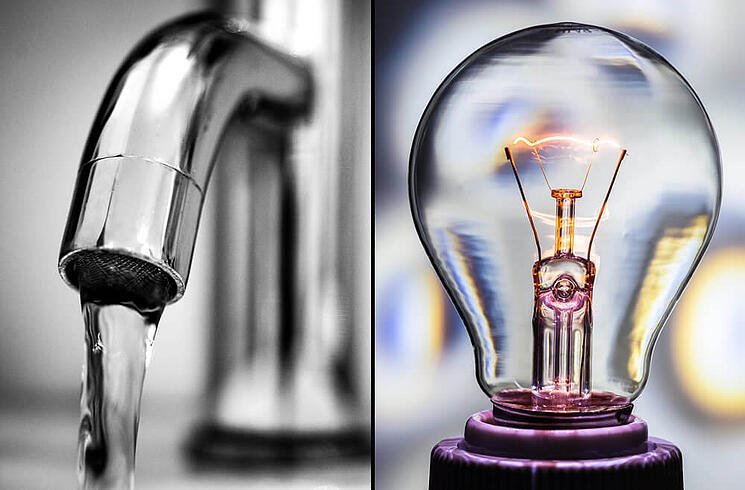
-